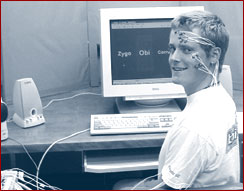
Research explores key to happiness

| Sensors attached to the face
detect muscle movement to determine if an object
on a computer screen prompts feelings of
happiness. | | | | Feb. 18, 2002— Why are people attracted to models who
have that "girl/boy next door" quality? Have you ever found that an
abstract painting grows on you with repeated viewing? Do you now hum
a tune that you once considered disharmonious?
Answers to
these questions can lie in the interface between perception and
emotion, says Piotr Winkielman, assistant professor of psychology.
His studies focus on why an easily perceived object (one whose
attributes are easily processed by the mind) can create a sense of
pleasure in viewers. In a research paper published in the December
2001 Journal of Personality and Social Psychology, Winkielman
reports how manipulating the ease of perception can change emotions
and attitudes towards objects.
"People like objects they can
easily wrap their minds around," Winkielman explains. "Whether
perceiving, thinking about or recalling something, our minds find it
pleasurable to be able to easily process the
information."
Words like "pleasant," "nice" and "like" are
subjective and vary among people. In Winkielman’s research, he has
quantified these concepts by measuring subtle changes in electrical
activity of facial muscles (a technique called facial
electromyography). When viewers are pleased with an object, they
smile; when they are not pleased, they frown. The muscle movement is
recorded and used to determine how much a person liked or disliked
something.
How does this theory explain our partiality for
certain faces, paintings and music? "People like faces that are
averages of faces they’ve seen before because it’s easier for the
mind to perceive an average," Winkielman explains. This is why
societies differ in what they consider attractive — an average face
there is different than what it is here.
"People like things
more when the mind gets practiced at processing the information,"
Winkielman adds. "It feels much more pleasant than the first time
due to the mental expertise acquired through repeated
exposures."
|
| | |